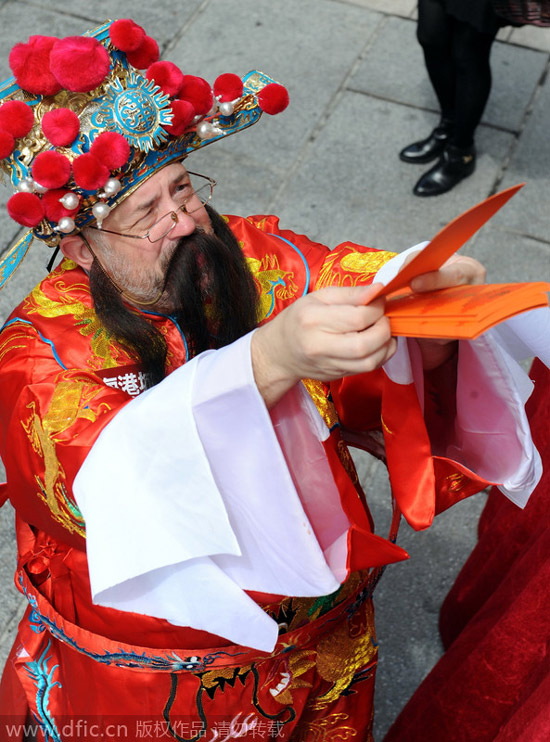It's not just the gift, but the thought behind it
By SUN XIAOCHEN (China Daily) Updated: 2015-02-24 09:36Understanding cultural differences is essential when giving presents
 |
|
A man playing the role of the God of Fortunes gives out 'red envelopes' to visitors in Hong Kong, on Feb 23, the fifth day of the Chinese Lunar New Year. |
However, his gesture suddenly seemed inappropriate as he realized the Chinese at the ceremony had red envelopes filled with cash to present rather than a packed gift.
"It's a little bit embarrassing when you present something that people didn't expect to receive on certain occasions," Levine, who used to be a social worker in the US, told China Daily recently.
"In the US, people do that (give cash) as well but only for close relatives. People would normally give things as presents, while here in China red envelopes are more commonly welcomed."
It was the first time the 66-year-old discovered the etiquette-including taboos-in gift giving. He was not alone, as the recent controversy following a British minister's visit to Taipei, Taiwan, revealed.
British Minister of State for Transport Baroness Susan Kramer presented a watch in January to Ko Wen-je, the mayor of Taipei, when she visited the city, inadvertently sparking headlines as she broke a long-held taboo in Chinese culture.
A clock or watch, or zhong in Mandarin, signifies "the end" in Chinese, and many associate it with death. Therefore, giving someone, especially an elder, a clock or watch implies "your time is up".
Kramer later apologized for the gaffe, but Ko also came under fire for his "rude" response as he told reporters that he had no use for the watch and would sell it for cash.
However, some expats in China, such as Mark Dreyer, stand by Ko in this particular debate.
"When I heard about the story, I felt embarrassed," said Dreyer, a British citizen who has lived and worked in China since 2007.
- Govt encourages people to work 4.5 days a week
- Action to be taken as HIV cases among students rise
- Debate grows over reproductive rights
- Country's first bishop ordained in 3 years
- China builds Tibetan Buddhism academy in Chengdu
- Authorities require reporting of HIV infections at schools
- Typhoon Soudelor kills 14 in East China
- Police crack down on overseas gambling site
- Debate over death penalty for child traffickers goes on
- Beijing to tighten mail security for war anniversary







